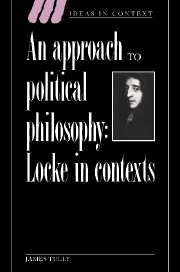9 - Liberty and natural law
Published online by Cambridge University Press: 20 November 2009
Summary
Part one is an analysis of Locke's concept of natural and civil liberty in the Two treatises. His account of liberty in the Essay is interpreted within the framework laid down in the Two treatises. I continue to believe that this early interpretation of natural and civil liberty is substantially correct and crucially important for understanding the formation of the concept of civil society or ‘public sphere’ in which citizens actively judge the policies of government in light of the public good. Whereas Hobbes and the absolutists argue that citizens alienate their independent political judgement as a condition of subjection, civic humanists uphold independent political judgement but tend to restrict its exercise to those directly engaged in government. Locke, in contrast to both, grants to citizens not in government the right to discuss and judge their governors in public, to dissent, and, if necessary, resist, when they transgress the public good.
However, as I worked on chapter 6 I came to see that the interpretation of Locke's natural law as ‘rationalist’ rather than ‘voluntarist’ was mistaken. I took Hobbes' extreme form of moral and legal voluntarism as a benchmark and assumed that any theory short of that was rationalist. But it became clear that Locke developed his theory of natural law within an intellectual context set by Pufendorf of ‘mitigated’ voluntarism in which the creation of the world is purely contingent, as in all forms of voluntarism, yet once it is created certain unalterable and rational rules of human conduct follow that god ordinarily binds himself to obey, as in rationalism.
- Type
- Chapter
- Information
- An Approach to Political PhilosophyLocke in Contexts, pp. 281 - 314Publisher: Cambridge University PressPrint publication year: 1993
- 1
- Cited by



